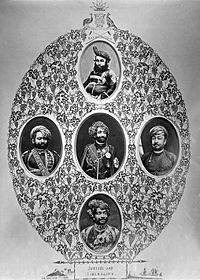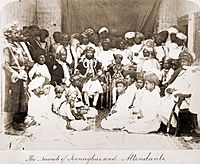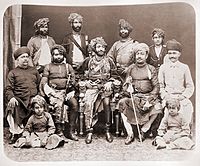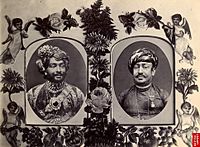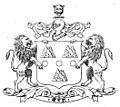Junagadh State facts for kids
Quick facts for kids Junagadh State
જુનાગઢ રિયાસત
|
|||||||
|---|---|---|---|---|---|---|---|
| Princely State of British India | |||||||
| 1730–1948 | |||||||
| Area | |||||||
|
• 1921
|
8,643 km2 (3,337 sq mi) | ||||||
| Population | |||||||
|
• 1921
|
465,493 | ||||||
| History | |||||||
|
• Established
|
1730 | ||||||
|
• Indian integration of Junagadh
|
1948 | ||||||
|
|||||||
| Today part of | Gujarat, India | ||||||
Junagadh was a princely state in Gujarat, a region in India. It was ruled by Muslim leaders. This state existed during the time of British India until it became part of India in 1948. A princely state was a region in India that was not directly ruled by the British, but by its own local ruler. However, these rulers often had agreements with the British.
Contents
History of Junagadh
The state of Junagadh was started by Mohammad Sher Khan Babi. He was a Pathan from the Babi Khel tribe. He was loyal to the Mughal governor in Gujarat.
Junagadh declared its independence in 1730. This happened after the Marathas, another powerful group, invaded the area. Mohammad Sher Khan Babi was the first ruler of the Babi Dynasty in Junagadh. His family, the Babi Nawabs, ruled a large part of southern Saurashtra for the next two hundred years.
At first, Junagadh was a state that paid tribute to the Marathas. This meant they paid money to a more powerful group to stay safe. Later, they came under the rule of the British Raj. The British Raj was the period when the British ruled India.
In 1807, Junagadh became a British protectorate. This meant the British protected the state, but also had some control over its affairs. By 1818, the East India Company, a British trading company, took control of the state. The Saurashtra area, where Junagadh was located, was managed by the British under the Kathiawar Agency.
Junagadh Joins India
When India gained its independence on August 15, 1947, princely states had to decide if they would join India or Pakistan. The Nawab of Junagarh, the ruler of Junagadh, decided to join Pakistan.
However, the Indian government believed the people of Junagadh should decide their future. Most people in Junagadh were Hindu, while the ruler was Muslim. Pakistan officially accepted Junagadh's decision on September 13.
This caused a revolt among the Hindu majority in Junagadh. There were also protests in nearby states that had joined India. The Nawab then tried to take control of some of these surrounding states.
The Indian government sent a small army to bring order back to the region. The Nawab then fled to Pakistan. His chief minister, called the Dewan, agreed for Junagadh to be ruled by India. This led to Junagadh becoming part of India.
Rulers of Junagadh
The rulers of Junagadh were called Nawabs. They were from the Pathan Babi khel tribe. The British authorities honored them with a 13-gun salute. This was a special honor given to important rulers.
Here are some of the Nawabs who ruled Junagadh:
- 1730 - 1758: Mohammad Bahadur Khanji (also known as Mohammad Sher Khan Babi)
- 1758 - 1774: Mohammad Mahabat Khanji I
- 1774 - 1811: Mohammad Hamid Khanji I
- 1811 - 1840: Mohammad Bahadur Khanji I
- 1840 - 1851: Mohammad Hamid Khanji II
- 1851 - 1882: Mohammad Mahabat Khanji II
- 1882 - 1892: Mohammad Bahadur Khanji II
- 1892 - 1911: Mohammad Rasul Khanji
- 1911 - 1948: Mohammad Mahabat Khanji III (the last ruler)
The Junagadh Dispute
Even today, many people in Pakistan believe that Junagadh should belong to them. They say that the vote (called a plebiscite or referendum) held in 1948 was not fair. This vote, which happened when the Indian army was in control, showed that most people wanted to join India. Pakistan has never accepted these results.
One reason for Pakistan's view is the situation in Kashmir. Kashmir had a Hindu ruler but a Muslim majority. It joined India. Pakistan argues that Junagadh, with its Muslim ruler and Hindu majority, should have been allowed to join Pakistan.
India saw Junagadh as very important. It was the main state in the western Kathiawar region. It was surrounded on three sides by states that had joined India. On the fourth side was the Arabian Sea. This made Junagadh very important for both countries. India did not want a Pakistani state in the middle of its own territory. India's decision to take control of Junagadh to restore order is seen by Pakistan as an excuse to take the state.
Images for kids
See also
 In Spanish: Junagarh para niños
In Spanish: Junagarh para niños
 | Madam C. J. Walker |
 | Janet Emerson Bashen |
 | Annie Turnbo Malone |
 | Maggie L. Walker |




